Why Self-Doubt runs on Ego - Learnings from Meditating 100 Hours in 10 Days
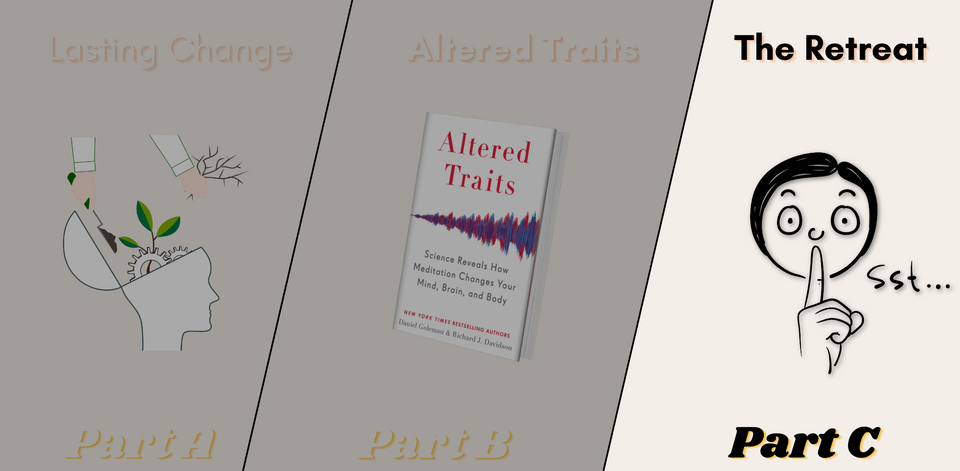
If I had a penny for every time I was asked “How was the Retreat?!” over the past month, I'd have about 60 cents. Not a lot of money, but a lotta questions. The short answer:
It was my personal fall from Mt. Stupid into the Valley of Despair.
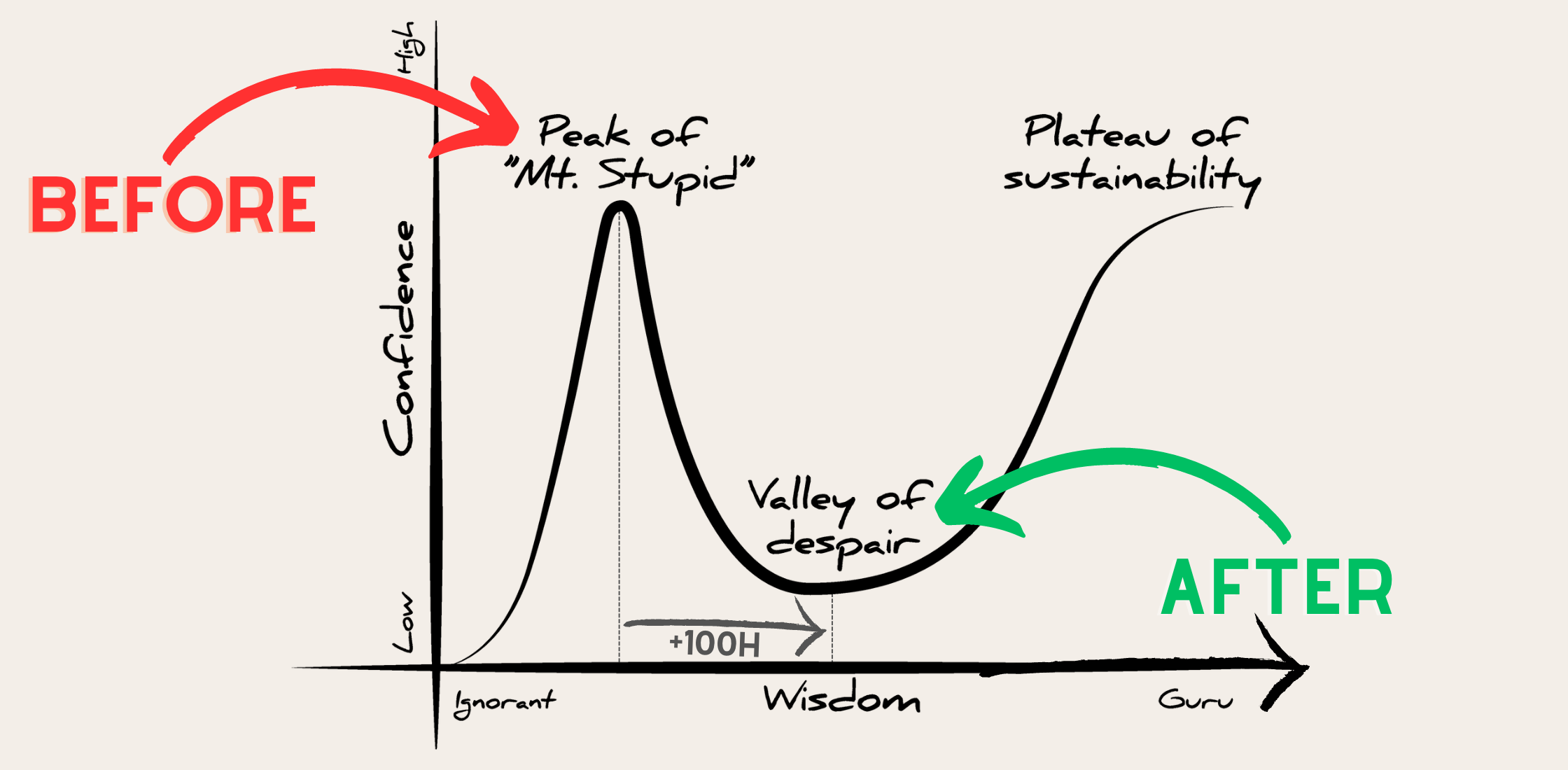
Painful and amazing at the same time, I was humbled like never before. It's among the hardest things I've done in my life, but I'm definitely coming back for another round next year. So to finish off the series on Meditation, today I’ll share what ten days of silence taught me about self-doubt and ego. We'll get there. First, a little context:
What the hell is a Vipassana Retreat?
Think of it like a bootcamp for learning a specific meditation technique. With the instruction refined slightly every evening, you spend your days in a simple routine:
- 4am: The morning bell rings.
- 4:30am: You’re in the meditation hall - 2 hours of practice
- 6:30am: Breakfast Break
- 8am: 3 more hours of practice
- 11am: Lunch break.
- 1pm: 4 more hours of practice
- 5pm: Tea break.
- 6pm: Last 3 hours of practice.
And then it’s 9pm and you fall into bed because tomorrow at 4, the morning bell rings. For 10 days in a row, this was all I did. Full commitment to the practice. No phones, no music, no communication with others, not even a notepad or a pen. And most importantly, no talking. The only one speaking is the teacher, and even that's restricted to the occasional "You must practice patiently and persistently" and an hour of discourse (-> theory) in the evening.
All in all very chill, if there weren't a catch: 3x a day, you practice an hour of Adhiṭṭhāna (Pali for strong determination), meaning you aim not to move a single muscle for the entirety of the sitting. Whatever sensation or urge may come up, you vow not open your eyes, hands or legs. Sounds hard, but is even harder in reality. Even though we do not notice it, we constantly move when sitting. Little adjustments to relieve pressure in joints and points of contact. Sitting cross-legged for an hour straight quickly becomes surprisingly painful. Especially when your left leg has had 4 surgeries in the last 5 years.
Now, it’s important to add that this is not the dangerous hand-on-stovetop kinda pain you need to react to. It’s merely slight discomforts amplified over time, and muscles telling you that they’ve been stretched for a hot minute now. After each sitting, you walk funny for about two minutes and then you’re good. It just doesn’t feel like that while you’re sitting. Which raises a valid question:
Why would one willingly subject themselves to this?
These sittings work like a check-in for your progress in the technique. In Vipassana, you learn to sit in a state of pure equanimity, witnessing all sensations without judgement. Experiencing the nose itch, the comfortable feeling of warmth and the intense knee pain with the same curiosity. By paying calm attention to the constantly changing sensations the body offers, you slowly start deconstructing sensations past the point of discomfort. What starts as “I HAVE CONSTANT PAIN IN MY LEFT LEG AND NEED TO CHANGE MY POSTURE NOW!” becomes a composed “There is a pulsing centre of heat on my lower left thigh, occasional stinging sensations arising and passing in the knee, and a straining stretch on the top of the left thigh, reaching about halfway up to the hip.”
Sounds great in theory, doesn't it? Through the book I wrote about last week (Altered Traits), I'd even learned about the neurological mechanism behind it: Functional Decoupling:
Through practice, one can learn to decouple these circuits - meaning they can operate independently. Once you lose the painful connotation, the sensations just become something to be curious about.
Amazing stuff!
So there I sat in my first Adhiṭṭhāna, thinking I have it all figured out. I'm publishing a research paper on Meditation and Burnout, I've been practicing for years, blablabla. I was the perfect example for Dunning-Kruger: High up on Mt. Stupid, I expected my understanding of neuroscience to make the retreat an easy feat. Great plan, except it didn't work at all. Of my first 11 attempts (aka the first eight days), I successfully made it through 1. Every other time, I broke before the hour was over.
You see, to make it through the hour of Adhiṭṭhāna you need to remain in this decoupled state for the whole hour. But in an hour of full attention, about a million sensations come up and pass.
Some you manage to observe in a perfectly calm way. Say an impatient thought about the remaining time comes up. “When's this gonna be over?”. So you recognise, calmly: “A thought about time has arisen.” Like the sting in your knee that came and went, you observe the thought, let it disappear on its own, and now it's gone. Sweet as.
But some thoughts stick. Remember, you’re alone with yourself for whole hour. So your brain has a lot of time to throw stuff at you. Most thoughts pass instantly, but some just capture you. For me, this was doubt about my practice. I'd been meditating for years, I wrote my thesis about it, I learned about the neuropsych - I'd convinced myself that I knew stuff. So when my equanimity inevitably started to wobbling a bit, it was instantly met with judgement. "You haven't practiced enough. You're not patient enough. You're doing this wrong."
The thought comes up, and you latch on to it. No more objective observing, now you’re identified with it. Go down the rabbit hole, start feeling bad. Your balance starts shaking. When your balance starts shaking, the intense discomfort of pain starts creeping back. So now you get frustrated that you lost your balance and have to experience this unpleasant sensation again. “I don’t want it to be like this, I want my balance back!” Still, you’ve got your instructions in mind, so you try to regain objectivity. “This is the way things are right now. I may be shaking a bit, but I can come back to a calm state.” But now the difference is that you crave this calm state, badly. You’re in pain. “I WANT IT. I WANT THE CALM STATE.”
With a mind that agitated, it is impossible to feel the subtle sensations that you felt when you were calm. Meanwhile, your legs are burning up. Now everything sticks. The Balance is gone, the pain becomes unbearable - there comes the change of posture. Where’s that strong determination now?
I took a nap???
Constant failure takes a toll. After 8 days, my confidence was gone. In its place, doubt had built a comfy little camp. Not just doubt in my ability to practice Adhiṭṭhāna. That would we way to sensible. Instead, try Doubt in myself and everything I stand for. Questioning my diligence, my patience, my abilities, the quality of my character and just about everything in between. Over years, I’d defined myself by succeeding at things through patience and discipline. I'd focused my research and personal practice on meditation. But there I sat, confronted with lots of evidence to the contrary.
I’d failed 10/11 attempts, I was increasingly agitated and exhausted, and as a result, less concentrated in my sittings. Never mind that I was still practicing 10h every day, slowly improving from 30 to 35 to 40 to 45 minutes before changing posture - to the ego, that didn’t matter. I wasn’t succeeding at the things I thought defined me.
So when I sat down for 1am practice on Day 8 and found myself struggling to concentrate, I got even more frustrated. Who cares that I’d been practising since 4:30am, just like the seven days before, “This was unacceptable.” Because of my frustration, it became even harder to focus. “This is pointless,” I thought.
Then, the unthinkable: A thought came up to go for a nap before the Adhiṭṭhāna at 2:30. How dare I think something like that? I’m the disciplined guy, remember? But for reasons I don't understand to this day, I got up and started walking.
“I’m never gonna forgive myself for this,” I thought on the way to my quarters. “Sleeping during practice hours? Unacceptable.”, I thought as I opened the door. “This is wrong,” I said to myself as I pulled the blanket over my shoulders. And then I passed out.
As I was woken up by the bell for the 2:30 Adhiṭṭhāna, I felt just as expected. Incredibly disappointed in myself. "You actually did it. You slept during practice hours. Guess you’re not as diligent as you thought, hey. Not as disciplined. Not as good at meditation." Naturally, this didn’t remain limited to my meditation skills - after all, it concerned these central tenets of what I thought defined me as a person. So as I went over to the hall for my 2:30 practice, a wonderful tirade started. Half an hour of insults I wouldn’t like to repeat here. The essence revolved around “You’re not as good a person as you thought you were” in all various shapes and forms.
But here’s the thing: This is Day 8! At this point, I had practiced for 80 hours, even if I didn’t wanna give myself the credit. So there I sat, well-rested from a nap, with my attention trained to objectively scan any sensation that comes up, calmly moving on to the next one. As these thoughts of abuse came up, I just started observing them. As a matter of experience, a thought has the same characteristic as any other sensation. Like an itch arises, changes around a bit, and then passes never to be seen again in the same way, a thought does too. The thought would come, lead to varying sensations around my stomach and chest area, and then pass.
The same way I trained myself to observe the leg pain and deconstruct it, I observed and deconstructed the thoughts. For thirty minutes, I saw ever-new ways to phrase "You're not good enough" arise and pass - until my inner critic ran out of fuel. “Do you have anything more to say?”, I remember thinking to myself. I didn’t. I had calmly accepted that I’m not the man, not as diligent as I thought, don’t know as much about meditation as I thought, that I had taken a nap during practice hours - because all of these things were true. I couldn’t find anything wrong with it. So what was the point of this bitter aversion?
There was none. So, there I sat for another thirty minutes, now just observing sensations in my legs, arms, back, head, another thought - nothing felt as bad as the first half. From this point on, I succeeded at every single Adhiṭṭhāna. Why? The answer is really quite simple.
Self-Doubt runs on Ego
To no one’s surprise, my biggest enemy during the retreat was myself. Makes sense - there was no one else involved. But the mechanism was fascinating. This is how I make sense of it:
Being the Man
The central issue that kept me from progressing the way I wanted to was my assumption that a) I know shit about meditation and b) this is conditional for my worth as a human. As I came to find out that both are wrong, I was finally free to start learning. Take it from the Stoic Philosopher Epictetus:
It is impossible for a man to learn what he thinks he already knows.
So as long as I was still of the belief that I’m the man & I’ve got this figured out (and if it’s conditional to my worth, I’m gonna hold on to that with all my power), it was only natural that I wasn’t progressing as I wanted. It took 80 hours of straight evidence for me to finally accept reality.
Being Free
And here’s the fascinating thing: Throughout those 80 hours, it was this very evidence that sabotaged my progress. Thoughts like “You’re not practicing right”, “You haven’t been as diligent as you should” or “I have no idea if this is supposed to feel like it does” are devastating when you feel like you're supposed to have it figured out. The thing is: At times, I wasn’t practicing right. I wasn’t as diligent as I should. And I had no idea if I was doing this right. All of those were true. They just weren't a bad thing. Actual progress takes leaving behind the assumption that to be worthy, you’re required to have it all figured out.
It’s incredibly liberating to give yourself permission to learn. But before, you need to be ready to accept you still have to learn.
One More Thing:
I want to clarify that I’m not claiming I’ve defeated my ego or something stupid like that. That sort of thought is just once again a manifestation of ego - “Look at me, so strong that I conquered my ego.” It’s still there, alive and thriving, and I’ve got so much more work to do.
Rather, let me offer this comparison: Even though I didn’t notice, I was carrying this heavy load on my head. I came to the retreat with 100kg on my head, and I might have shaved off 1 or 2. 98 more to go. Still, the longest journey starts with the first step.
Congrats, you’ve made it! I'm not entirely done though. To keep this essay at a almost-reasonable length, I had to leave two of three key takeaways out. Still, I want to share the whole experience to give an accurate picture. So today, get ready for Double Trouble! If you're still keen (or want to save something for later), I wrote a little Bonus Post. This one goes into:
- How the retreat showed me the problem with losing yourself in intellectual games
- How to start enjoying the ride along the emotional rollercoaster
- How Life provided me with the perfect test of my practice the day I left the retreat (feat. an unexpected bill of $2000)
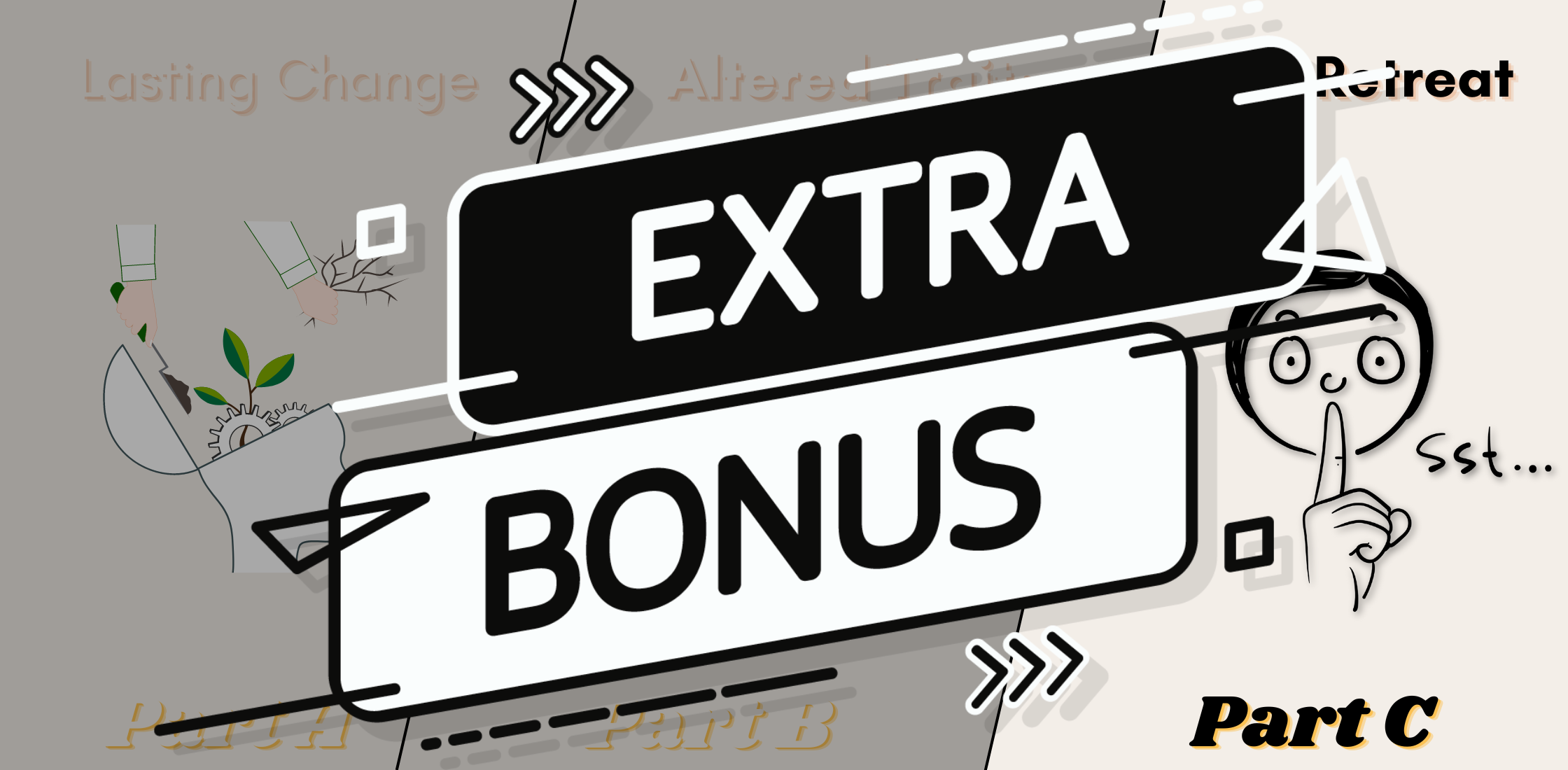


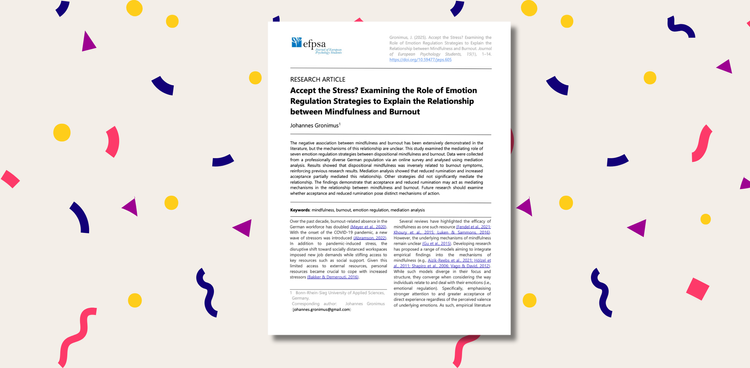
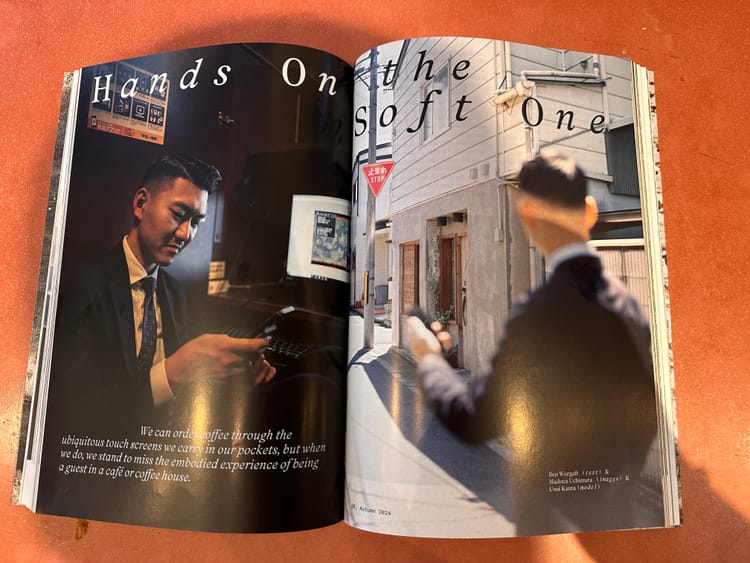
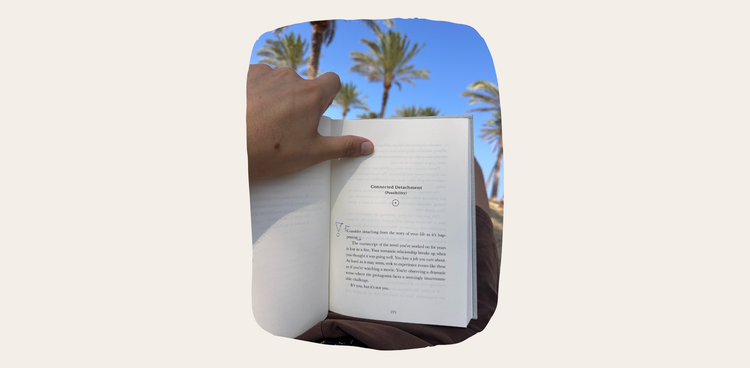
Comments ()